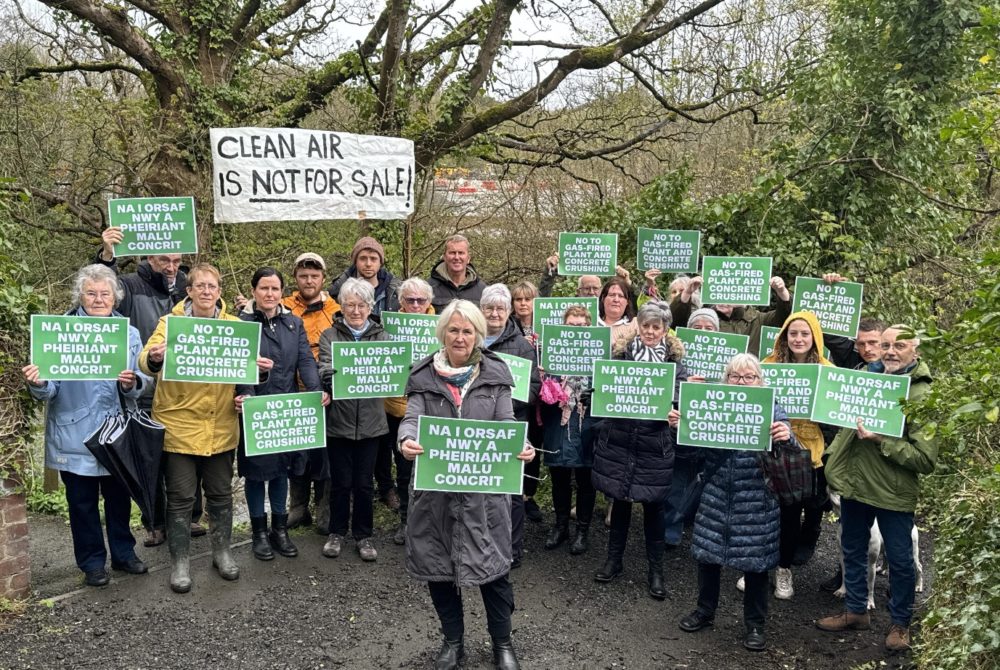Campaigners raise pollution concerns over development plans on former brickworks site

A campaign group has mobilised to oppose two developments proposed around the site of a former brickworks.
The brickworks at Seiont Quarry closed in 2008, ending a near 200 year history of brick making in Caernarfon.
The organisation Caernarfon Lân is challenging plans for a ten-engine, 20MW gas-fired “peaking plant” to generate electricity to sell to the National Grid at times of high demand due to concerns about toxic emissions and noise pollution and its possible impact on the environment.
It is also opposed to a second proposal, an application to install a concrete crushing and processing plant on the same site, right next to the ten gas-fired engines.
Objection
Gretel Leeb, who chairs the group’s committee, has coordinated the drafting of two substantial Objection Documents setting out technical, regulatory and ethical reasons why both proposals should be turned down.
She says: “Our group has campaigned for months against the proposed gas-fired peaking plant in Caernarfon, setting out clearly the environmental and health threats posed by that initial proposal.
“Then, in the run up to Christmas, new proposals came to light for concrete crushing and processing operations on the same site.
“The proposed location, the site of the old Seiont Quarry, should set alarm bells ringing for local people, as the topography and situation of the site, surrounded by housing estates, a hospital, a local park and sports fields, the River Seiont and ancient natural woodland, makes it probably the worst place for these two highly polluting developments.
“Gas-fired peaking plants emit high levels of noise when they are operating and several harmful pollutants including Nitrogen Oxides, the health impacts of which include increases in respiratory diseases and asthma; eye, nose, and throat irritation; heart conditions; and lung damage.
“On top of all of that we now find that we’d be exposed to very serious threats to health from the noise, dust and harmful particulates that would be generated by the proposed concrete processing and by the constant passage of an estimated 120 lorries per day.
“The threat of damage to local ecosystems and to biodiversity, from the same pollutants, is also a cause for very great concern.
“Neither of these two proposals would align with new Welsh Government regulations and changes in planning policy concerning noise, air pollution and net benefit to biodiversity.”
Well-being of Future Generations Act
Siân Gwenllian MS, who represents the town in the Senedd said: “ “I have expressed my concerns regarding a proposed peaking plant gas station in the town of Caernarfon as early as August 2023, and I have aired those concerns to the Welsh Government which will ultimately make a decision based on the recommendations of Planning and Environment Decisions Wales (PEDW).
“I have made it clear on the floor of the Senedd that I’m of the belief the proposal contradicts the spirit and aims of the Well-being of Future Generations Act and the Welsh Government’s own climate targets, and should be rejected.
“But since then, proposals for a concrete crushing plant on the same site have emerged.
“If the proposals were to go ahead, it is estimated that the traffic flow would be 1 lorry every 5 minutes, 10 hours per day, 5.5 days per week. Furthermore, in addition to very high levels of noise, the concrete crushing process uses substantial amounts of electricity and large amounts of water to dampen the harmful dust created by the process.
“Needless to say, as is true of the gas-fired plant, serious risks are posed to human health and well-being, and to the sustainability of the surrounding natural environment.
“I have now sought assurance by the Chief Executive of Cyngor Gwynedd that the second application will go before Gwynedd Council’s Planning Committee, and won’t be solely in the hands of planning officers. In that case my constituents will be able to make their views known to their local councillors who will be able to relay their concerns to committee members.”
Gwynedd Council
Whilst the final decision on the gas plant’s fate rests with the Welsh Government, the application to install the concrete crushing plant will have to go to Gwynedd Council for a final decision.
The Caernarfon Lân group has launched a petition where local people can voice their opposition.
In a statement issued last year, Jones Brothers Ltd, the company behind the plans said: “The Scottish Power Energy Network (SPEN) and the National Grid have noted that there is a demand for peak generation capacity within North Wales and this scheme would contribute towards meeting this demand.
“Therefore, the scheme does not necessarily result in the reduction of energy demand but would contribute towards meeting existing energy demands in the area and providing security of electricity supply which in turn allows consumers greater confidence in choosing electrical energy instead of other fossil fuel supplies.”
“Using stand-by ‘peaking’ generators to meet short term demands is more energy efficient than keeping larger generators running at reduced load. Manufacturer data for the proposed 20MW units shows that when operating at 100% load, 42.5% of the energy in the gas fuel is converted to electricity, 44.2% to heat,” they added.
Support our Nation today
For the price of a cup of coffee a month you can help us create an independent, not-for-profit, national news service for the people of Wales, by the people of Wales.







Gas peaking plants are old technology that pollutes and is increasingly not needed, batteries will replace such plants entirely in a few short years.